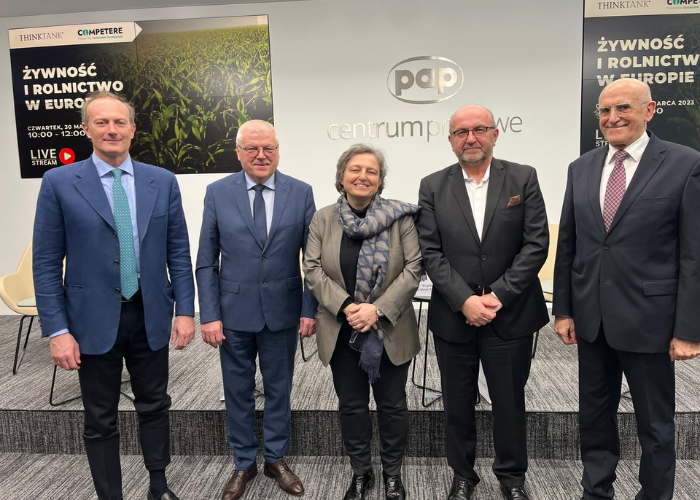The Impact of FoP Labels on Poland’s Food SectorPRESS RELEASE
- 31 March 2023
- Posted by: Competere
- Categories: Empowering Consumers, highlights, News

On March 30th, Competere together with THINKTANK, hosted a debate to investigate the Polish agrifood sector in relation to European rules and laws. Specifically, the roundtable explored whether the reform of FoP labelling can be a driver or detractor for the Polish food sector.
Russia’s invasion of Ukraine and the blockade of Black Sea ports led to the increase in food prices and caused great concern in countries that depend on imports of grain and other agricultural products from these two countries. Middle East, Africa and Asia are regions most at risk of food supply shortages. Is Europe, including Poland, immune to such a crisis?
As a response to the challenges related to the food industry, the THINKTANK Institute in cooperation with Competere organized an expert debate on the agricultural and food situation in Poland and more broadly, in Europe. The invited experts discussed food security in Europe and analyzed the possible effects of the European food labelling reform on Polish farmers and food producers.
The meeting was moderated by Dr. Małgorzata Bonikowska, president of THINKTANK Institute. Invited speakers were: dr. Andrzej Gantner, General Director of the Polish Federation of Food Producers, Pietro Paganini, co-founder of Competere.eu, Professor at Temple University in Philadelphia, Julian Pawlak, President of the Management Board of the National Union of Juice Producers and dr. Jerzy Plewa, Director General of DG AGRI in the European Commission in 2013-2019,
The war in Ukraine has significantly impacted the food industry and agriculture in Europe, according to experts. Dr. AndrzejGantner stated that Putin’s deliberate destabilization of Ukraine has turned food into a weapon and tool of pressure. Additionally, Prof. PietroPaganini expressed concern over the Front of Package labeling reform and the Nutri-score system. He believes that “the oversimplification of food as either good or bad without scientific evidence poses a threat to the Polish economy and food culture. This could force small and medium-sized farmers and food producers to reformulate their products to meet global health and taste trends, which may not always be possible or beneficial”. “The Nutri-score system stigmatizes products like fruit juices and preserves, causing significant harm to the industry” added Julian Pawlak.
Paganini reinforced his arguments by stating that EU policies must strike a balance between sustainability, consumer choice, economic factors, and the protection of European food culture and diversity. He emphasized that any changes must promote a healthier diet for European consumers while considering all the variables at stake. In summary, he stressed the need to balance economic factors with sustainability and consumer choice while protecting the region’s unique food culture and diversity.
Finally, invited speakers also summarized the impact of the ongoing conflict in Europe on the shape and priorities of the EU’s Common Agricultural Policy. “The reform of the Common Agricultural Policy will help all Member States to pursue common goals. The manner of implementation of these arrangements has been handed over to the Member States, which should end disputes within the Union in this matter” – said dr. Jerzy Plewa, commenting on the direction in which EU regulations are heading.
.



